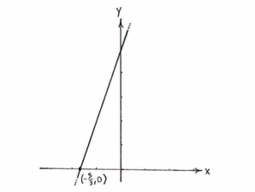Solution 2.2:6a
From Förberedande kurs i matematik 1
(Difference between revisions)
m |
|||
| (3 intermediate revisions not shown.) | |||
| Line 1: | Line 1: | ||
| - | {{ | + | According to the definition, the point of intersection between two lines is that point which lies on both lines; it must therefore satisfy the equations of both lines. |
| - | < | + | |
| - | [[ | + | If the point of intersection has coordinates (''x'',''y''), then |
| - | + | ||
| + | {{Displayed math|| | ||
| + | <math>\left\{\begin{align} y&=3x+5\,,\\ y&=0\,\textrm{.}\qquad\quad\text{(x-axis)}\end{align}\right.</math>}} | ||
| + | |||
| + | If we substitute <math>y=0</math> into the first equation, we obtain | ||
| + | |||
| + | {{Displayed math||<math>0=3x+5,\qquad\text{i.e.}\quad x=-\frac{5}{3}\,\textrm{.}</math>}} | ||
| + | |||
| + | The point of intersection is (-5/3,0). | ||
| + | |||
| + | |||
| + | <center>[[Image:2_2_6_a.gif|center]]</center> | ||
Current revision
According to the definition, the point of intersection between two lines is that point which lies on both lines; it must therefore satisfy the equations of both lines.
If the point of intersection has coordinates (x,y), then
|
\displaystyle \left\{\begin{align} y&=3x+5\,,\\ y&=0\,\textrm{.}\qquad\quad\text{(x-axis)}\end{align}\right. |
If we substitute \displaystyle y=0 into the first equation, we obtain
| \displaystyle 0=3x+5,\qquad\text{i.e.}\quad x=-\frac{5}{3}\,\textrm{.} |
The point of intersection is (-5/3,0).

